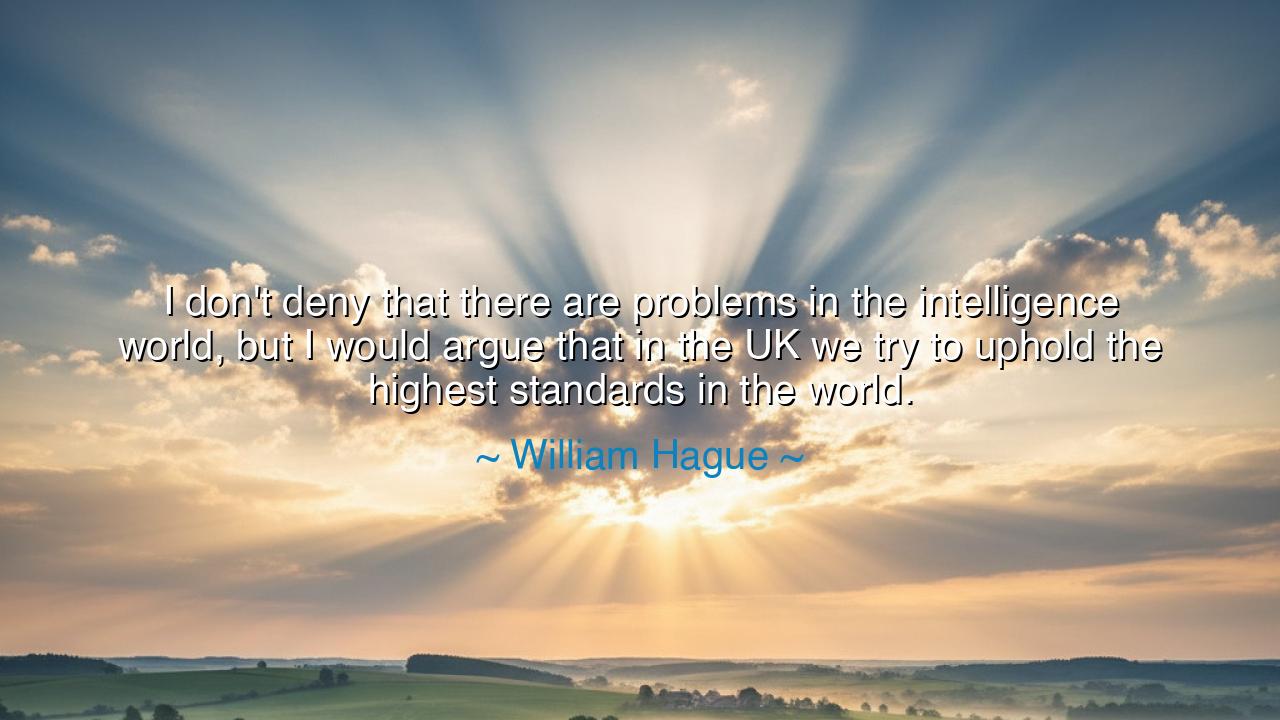
I don't deny that there are problems in the intelligence world
I don't deny that there are problems in the intelligence world, but I would argue that in the UK we try to uphold the highest standards in the world.






The words of William Hague, spoken with calm conviction and the weight of leadership, reveal a truth both humble and proud: “I don’t deny that there are problems in the intelligence world, but I would argue that in the UK we try to uphold the highest standards in the world.” In these words, we hear not the boast of a man defending perfection, but the voice of one who understands the burden of imperfection and the duty of integrity. Hague, who once guided the British Foreign Office and oversaw the realm of intelligence, speaks from within the shadowed halls of power — where truth is often hidden, and where honor must survive in silence. His statement is both an acknowledgment of human frailty and a vow of continual striving toward the light of ethical strength.
From the dawn of nations, the gathering of intelligence — the art of knowing what others conceal — has walked the edge between necessity and danger. It is an ancient craft, as old as kings and spies in Babylon or the scouts of Sparta. Every society that seeks to survive must see beyond its walls. Yet, to see in secret is to risk corruption; for where knowledge is hidden, temptation lurks. Hague’s words recognize this eternal paradox: that the intelligence world is both guardian and shadow, both shield and mirror. To admit its flaws is to speak truth; to claim pursuit of the highest standards is to keep faith with the moral compass that alone can guide those who dwell in the realm of secrecy.
Consider the ancient tale of Sun Tzu, the Chinese general and philosopher who wrote The Art of War. He praised the use of spies, saying that knowledge of the enemy could win battles without bloodshed. Yet even he warned that the wise ruler must be righteous in intent, for deceit without discipline becomes poison. Hague’s sentiment stands in this same lineage — that while intelligence work will always dwell near deception, the character of the nation that wields it determines whether that power serves peace or tyranny. To “uphold the highest standards” in the secret world is not mere policy; it is a matter of national soul.
The United Kingdom, through centuries of empire, war, and diplomacy, has long been both student and master of intelligence. In the dark years of the Second World War, British intelligence achieved triumphs not through brute force but through brilliance — in the deciphering of the Enigma code, in the deception of Operation Fortitude, and in the unseen battles fought by men and women who worked not for fame, but for victory and survival. Yet even then, as in all ages, there were mistakes, betrayals, and moral costs. Hague’s words resonate as the voice of a leader who knows that every triumph of intelligence carries the shadow of moral compromise — and that integrity must be renewed with every generation.
There is courage in admitting imperfection, for denial breeds decay. To say, as Hague does, that “there are problems in the intelligence world” is to honor the truth that all human institutions are frail. But to add, “we try to uphold the highest standards in the world,” is to declare that greatness lies not in flawlessness, but in the relentless pursuit of betterment. It is a statement of faith — not in perfection achieved, but in righteousness sought. The mark of a just nation, like that of a just man, is not that it never errs, but that it never ceases to correct itself.
Let us look, too, to the story of Oleg Gordievsky, a Soviet officer who defected to the West, driven by conscience rather than ambition. He risked everything to serve a truth higher than allegiance to tyranny. His courage, and the willingness of the UK to protect him, reflects the moral dimension Hague speaks of — a standard rooted not only in efficiency but in ethics, not only in secrecy but in justice. For what use is intelligence, if it serves only power and not principle? The true greatness of a nation’s intelligence lies not in how much it knows, but in how rightly it uses that knowledge.
Thus, the lesson of William Hague’s words is clear: integrity must be the heart of every hidden act, and honor must be the compass even in the labyrinth of secrecy. We who live outside the walls of intelligence can learn from this truth. Whatever our work — whether in commerce, art, or governance — we too move through worlds where compromise tempts and shadows beckon. The challenge is the same: to strive for the highest standards, to act with transparency of spirit even when life demands secrecy of hand.
So, dear listener, remember this: the highest standard is not perfection, but conscience. To acknowledge imperfection is wisdom; to rise above it is greatness. Uphold your standards not because others demand it, but because truth demands it of you. For though few of us serve in the secret chambers of intelligence, all of us dwell in the greater intelligence of life — where integrity is the light that guides us through the unseen, and honor is the only victory that endures.






AAdministratorAdministrator
Welcome, honored guests. Please leave a comment, we will respond soon